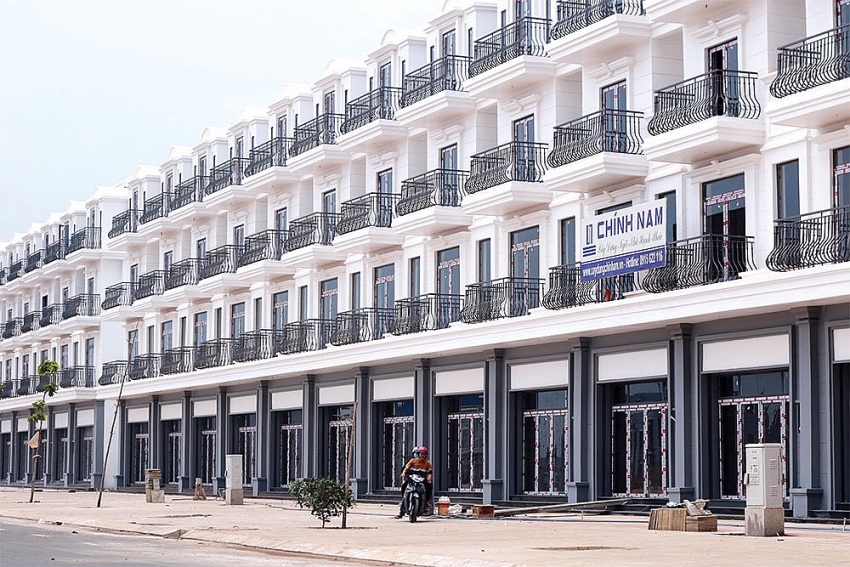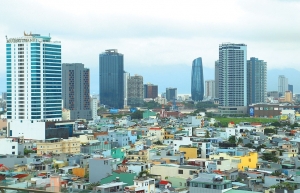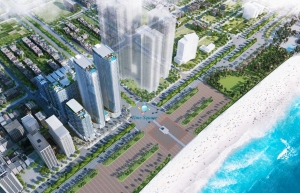Further amendments likely to help real estate recovery
 |
| Integrated townships and other models have been unveiled in various localities up and down the country in recent months, Photo: Le Toan |
Marubeni Corporation, one of Japan’s largest integrated trading and investment conglomerates, this month established a comprehensive partnership with Hung Thinh Corporation in green energy, real estate investment, and smart city research.
The two sides signed an agreement on real estate development in Vietnam on July 13. Their first project within the partnership is located in the new administrative centre of Thu Duc in Ho Chi Minh City, with an estimated investment of over VND10 trillion ($434 million).
The two corporations will design a business model and operate the project, as well as prepare smart development plans.
Singapore’s Keppel Corporation, through its Infrastructure Division, has secured contracts worth over $70 million to provide long-term energy-as-a-service to Republic Holiday Inn, Republic Suite Plaza, and Estella Place in Ho Chi Minh City, as well as Grand Mercure Quang Binh.
The contracts were signed on July 10 at the opening of a state-of-the-art, intelligent operations nerve centre in Keppel Corporation’s 64-hectare integrated township, which is also being developed in Thu Duc.
The examples show continuous interest from foreign investors in the Vietnam real estate market, despite the current downturn trend.
Speaking at a workshop on the potential of Vietnam’s real estate market held on July 13, Nguyen Anh Tuan, former deputy director general of the Foreign Investment Agency (FIA) under the Ministry of Planning and Investment, said real estate ranked second in overseas funding attraction, only after processing and manufacturing. Among the 48 countries and territories investing in Vietnam’s real estate market, Singapore takes the lead, followed by South Korea and Japan.
Tuan noted that most foreign investors in real estate are large-scale firms, and many projects are worth billions of US dollars, explaining that Vietnam had advantages in terms of political stability, high economic growth, competitive production cost, abundant workforce, geographical location, and other areas.
“Over the past 35 years, foreign investors have contributed to standardising the Vietnamese real estate market, and building facilities that meet regional and international standards,” Tuan said.
Interest high
Meanwhile, Joseph Low, president of Keppel Land Vietnam, suggested Vietnam ensure land supply amidst its rapid urbanisation and the growing middle class, and optimise land in central areas, towards a sustainable real estate sector.
“Currently, the housing supply is constrained by multi-faceted challenges such as liquidity crunch and complex approval process. If left unresolved, these issues would heighten market uncertainties, leading to increased cost of construction and ultimately result in higher housing prices for the Vietnamese,” Low said.
He added that the government had been trying to streamline and accelerate the approval process. Such efforts must continue at a greater pace, to minimise the gap between the demand and supply of housing needs.
“These are the two key areas we see in Vietnam, and some suggestions that the government may wish to consider jointly pursuing with real estate industry players, to strike a balance between meeting the nation’s development goals and preserving the environment,” he said.
Vietnam has many advantages compared to other countries in the region to draw investment. However, Tuan of the FIA also said that there were a number of foreign-invested real estate projects that were still inefficient, with large-scale land projects that were slow to implement due to problems with social order.
In addition, the legal system on the real estate market is not synchronised, clear or timely revised while administrative procedures related to investment, construction, bidding, especially land are extremely complicated, leading to the prolonged implementation of ventures. Real estate credit and corporate bond issuance are also being strictly controlled.
“Attracting foreign investment in the real estate sector should be directed towards ensuring the elements of green transition, environmentally friendly, smart urban areas, smart cities and industrial real estate towards the ecological transformation,” he added.
Government efforts
Meanwhile, Deputy Minister of Construction Nguyen Tuong Van declared that the ministry had presided over the drafting of the revised Law on Housing and the revised Law on Real Estate Business. The two draft laws were submitted to the National Assembly in May and are expected to be approved in November this year.
Van said that the amendment and completion of these two laws would have a positive impact on the housing and real estate markets, greatly improving confidence in the investment environment, and creating transparency and stability.
“This is especially necessary for the recovery and sustainable development of Vietnam’s real estate market. The Ministry of Construction is committed to accompanying domestic and international businesses and investors in promoting the sustainable development of the real estate market in Vietnam,” he said.
Nguyen Van Khoi, chairman of the Vietnam Real Estate Association, said that the real estate market was now quiet across many segments, with a slight increase in the social housing and industrial real estate segments.
“If we focus on solving the aforementioned groups of difficulties and problems, and reduce interest rates, in early 2024, the real estate market will show more signs of recovery, and many real estate products will come on to market,” Khoi said.
According to him, a suitable lending interest should be reserved for every segment of commercial housing, social housing, and high-end housing, to entice and support buyers and investors.
He also suggested the need for an effective mechanism to unclog capital flows in the corporate bond market, creating conditions to support enterprises and guide them to offer and trade corporate bonds, providing debt relief for enterprises that are due for repayment, and shortening procedures.
In terms of long-term solutions, it is necessary to synchronously issue amendments to the laws on land, housing, and real estate to avoid overlapping mechanisms and ensure policies are attractive enough for investors and real estate buyers, Khoi said.
For developers and investors, it is necessary to restructure products, giving priority to the segment that meets the needs of the majority of people; re-administer enterprises; and redefine costs to lower selling prices in the market.
Vietnam has attracted 37,500 foreign-invested projects worth nearly $450 billion to date, including 1,100 projects in real estate with a total capital of $66.4 billion.
| Alex Crane - Managing director, Knight Frank
Regarding the investment and capital markets, since the inception of Knight Frank’s quarterly notes, this is the first quarter with no new investment inquiries of more than $10 million each coming in from overseas. That is not to say the market is illiquid. Investors are here and still sweet on Vietnam with cash to spend for clean development or well-valued investment opportunities. Sell-side valuation remains an issue, but with a reported significant transaction in Hanoi showing a reduction on the previous purchase price to the order of approximately 40 per cent, this may be a sign of things to come. Our recent comments made a splash regarding the Ho Chi Minh City office market, but what was not stated in many articles is that inquiry levels from multinational corporations are solid and they are generally growing headcounts. Amongst a few others in the second quarter are two massive deals from insurers totalling around 6,000 sq.m, demonstrating good activity. However, as deals are getting cut, so are rents, with some nice incentives thrown in for tenants to sign. Tenants are becoming ever more powerful. A slightly sour note follows through demand for ready-built factories and warehousing as a surge in supply continues to arrive in the face of lower index for industrial productions, and the well-known challenges around orders in key manufacturing segments. We suggest, however, that demand will continue to modestly drive ahead and will gradually catch up with supply as new industrial parks are generally slow to come online (+8 years in one case near Ho Chi Minh City). Industrial and logistics investments and development opportunities remain the most sought-after by active capital. During Q3 we aim to look at the impact of well-known delays of project approvals over the last 18 months. New approvals for the first three months of 2023 were down 63 per cent on-year and this could indeed become one of the major determining factors of the next few years’ performance across all sectors. |
 | Foreign investors flock to Vietnam's real estate market Vietnam's real estate sector has emerged as a highly desirable destination for international investors, ranking second only to the manufacturing and processing industry, with over 1,100 projects amounting to $66.4 billion of foreign investment. |
 | Revenue sharing going some way to ease condotel status The real estate market for resort villas and condos is showing signs of short-term recovery from a difficult period due to low liquidity. |
 | Overload caution sounded out over condotel switch More than 3,700 tourist apartments, which are part of the Times Square Danang complex, were converted into apartments by Danang People’s Committee in May, and are now causing concern about infrastructure overload both there and at future conversions. |
What the stars mean:
★ Poor ★ ★ Promising ★★★ Good ★★★★ Very good ★★★★★ Exceptional
Related Contents
Latest News
More News
- Saigon Centre gains LEED platinum and gold certifications (February 12, 2026 | 16:37)
- Construction firms poised for growth on public investment and capital market support (February 11, 2026 | 11:38)
- Mitsubishi acquires Thuan An 1 residential development from PDR (February 09, 2026 | 08:00)
- Frasers Property and GELEX Infrastructure propose new joint venture (February 07, 2026 | 15:00)
- Sun Group led consortium selected as investor for new urban area (February 06, 2026 | 15:20)
- Vietnam breaks into Top 10 countries and regions for LEED outside the US (February 05, 2026 | 17:56)
- Fairmont opens first Vietnam property in Hanoi (February 04, 2026 | 16:09)
- Real estate investment trusts pivotal for long-term success (February 02, 2026 | 11:09)
- Dong Nai experiences shifting expectations and new industrial cycle (January 28, 2026 | 09:00)
- An Phat 5 Industrial Park targets ESG-driven investors in Hai Phong (January 26, 2026 | 08:30)


 Tag:
Tag:





















 Mobile Version
Mobile Version